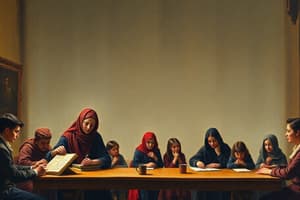Podcast
Questions and Answers
What is the primary potential benefit of education mentioned in the content?
What is the primary potential benefit of education mentioned in the content?
- Increase in job opportunities
- Promotion of social mobility (correct)
- Reduction in economic status
- Preservation of existing inequalities
Which of the following factors contribute to educational disparities?
Which of the following factors contribute to educational disparities?
- Increased educational funding
- Universal access to technology
- Socioeconomic status (correct)
- Parental education levels
What concept suggests that social status is based on individual abilities?
What concept suggests that social status is based on individual abilities?
- Equal opportunities
- Educational equity
- Social meritocracy (correct)
- Systemic privilege
What must be done to address educational disparities effectively?
What must be done to address educational disparities effectively?
Educational disparities are related to which of the following dimensions?
Educational disparities are related to which of the following dimensions?
What is a consequence of educational disparities mentioned in the content?
What is a consequence of educational disparities mentioned in the content?
Who is responsible for addressing the challenges created by educational disparities?
Who is responsible for addressing the challenges created by educational disparities?
What is one of the key roles of education in society according to the content?
What is one of the key roles of education in society according to the content?
What is the primary focus of sociology of education?
What is the primary focus of sociology of education?
How does education intersect with other social institutions?
How does education intersect with other social institutions?
What impact does education have on individuals and communities?
What impact does education have on individuals and communities?
What is a methodological approach used to study education sociologically?
What is a methodological approach used to study education sociologically?
What do scholars aim to critically examine within educational systems?
What do scholars aim to critically examine within educational systems?
Why is the sociology of education crucial for understanding society?
Why is the sociology of education crucial for understanding society?
What aspect of social relationships is shaped by education?
What aspect of social relationships is shaped by education?
Which theoretical perspective is likely to be examined in the sociology of education?
Which theoretical perspective is likely to be examined in the sociology of education?
What factors are considered in the process of socialization through education?
What factors are considered in the process of socialization through education?
What perspective focuses on peer interactions within educational settings?
What perspective focuses on peer interactions within educational settings?
Which of the following best describes the role of mass media in socialization?
Which of the following best describes the role of mass media in socialization?
How do educational institutions typically reflect social hierarchies?
How do educational institutions typically reflect social hierarchies?
What is one of the primary functions of education concerning social change?
What is one of the primary functions of education concerning social change?
What is a possible consequence of peer interactions in educational settings?
What is a possible consequence of peer interactions in educational settings?
Which of the following is a characteristic of teachers and authority figures in the educational context?
Which of the following is a characteristic of teachers and authority figures in the educational context?
In the context of education and society, which aspect is critical for addressing educational challenges?
In the context of education and society, which aspect is critical for addressing educational challenges?
What is the primary aim of educational reforms mentioned?
What is the primary aim of educational reforms mentioned?
Which program was introduced to extend basic education in the Philippines?
Which program was introduced to extend basic education in the Philippines?
What aspect of education do reforms focusing on curriculum and teaching methods aim to improve?
What aspect of education do reforms focusing on curriculum and teaching methods aim to improve?
What is a critical area for examination regarding educational initiatives?
What is a critical area for examination regarding educational initiatives?
What does the term 'Equity and Inclusion' refer to in the context of education?
What does the term 'Equity and Inclusion' refer to in the context of education?
What is one potential method for improving the quality of education according to the reforms?
What is one potential method for improving the quality of education according to the reforms?
What unintended consequences might educational reforms lead to?
What unintended consequences might educational reforms lead to?
Which skill areas are emphasized by the reforms in teaching methods?
Which skill areas are emphasized by the reforms in teaching methods?
What is the primary aim of the Philippine educational system reforms?
What is the primary aim of the Philippine educational system reforms?
Which law provides free tuition for students in state universities and colleges in the Philippines?
Which law provides free tuition for students in state universities and colleges in the Philippines?
What is a significant factor in promoting inclusive education according to the reforms?
What is a significant factor in promoting inclusive education according to the reforms?
What is one of the focuses of professional development within the educational reforms?
What is one of the focuses of professional development within the educational reforms?
Which of the following best describes the intended outcome of learner-centered approaches?
Which of the following best describes the intended outcome of learner-centered approaches?
The educational reforms aim to address which issue related to students with disabilities?
The educational reforms aim to address which issue related to students with disabilities?
What potential barrier does the Universal Access to Quality Tertiary Education Act aim to reduce?
What potential barrier does the Universal Access to Quality Tertiary Education Act aim to reduce?
What aspect is critical for evaluating the effectiveness of educational reforms?
What aspect is critical for evaluating the effectiveness of educational reforms?
What is the primary objective of Mother Tongue-Based Multilingual Education (MTB-MLE)?
What is the primary objective of Mother Tongue-Based Multilingual Education (MTB-MLE)?
How can professional development programs impact teachers in multilingual education?
How can professional development programs impact teachers in multilingual education?
What aspect of students' experiences does the analysis of policies and programs aim to identify?
What aspect of students' experiences does the analysis of policies and programs aim to identify?
Which of the following is a goal of inclusive classroom environments mentioned in the content?
Which of the following is a goal of inclusive classroom environments mentioned in the content?
What role do parents and communities play in the MTB-MLE policy development?
What role do parents and communities play in the MTB-MLE policy development?
What can be an outcome of traditional gender stereotypes in education?
What can be an outcome of traditional gender stereotypes in education?
What is a critical aspect of stakeholder engagement in educational programs?
What is a critical aspect of stakeholder engagement in educational programs?
What does the MTB-MLE policy recognize as important for effective learning?
What does the MTB-MLE policy recognize as important for effective learning?
Flashcards
Sociology of Education
Sociology of Education
A branch of sociology studying education as a social institution.
Social Institutions
Social Institutions
Organized systems like family, economy, and state, interacting with education.
Educational Inequalities
Educational Inequalities
Unequal access to resources or opportunities within educational systems.
Social Mobility
Social Mobility
Signup and view all the flashcards
Employment Opportunities
Employment Opportunities
Signup and view all the flashcards
Individual Well-being
Individual Well-being
Signup and view all the flashcards
Social Relationships
Social Relationships
Signup and view all the flashcards
Social Structures
Social Structures
Signup and view all the flashcards
Education's Role in Socialization
Education's Role in Socialization
Signup and view all the flashcards
Social Hierarchies & Education
Social Hierarchies & Education
Signup and view all the flashcards
Interactionist Perspective (Education)
Interactionist Perspective (Education)
Signup and view all the flashcards
Media's Socialization Impact
Media's Socialization Impact
Signup and view all the flashcards
Teachers and Authority in Socialization
Teachers and Authority in Socialization
Signup and view all the flashcards
Social Change (Education)
Social Change (Education)
Signup and view all the flashcards
Cultural Reflection (Education)
Cultural Reflection (Education)
Signup and view all the flashcards
Social Skills Development
Social Skills Development
Signup and view all the flashcards
Educational Disparities
Educational Disparities
Signup and view all the flashcards
Meritocracy
Meritocracy
Signup and view all the flashcards
Equal Opportunities
Equal Opportunities
Signup and view all the flashcards
Socioeconomic Status
Socioeconomic Status
Signup and view all the flashcards
Educational Outcomes
Educational Outcomes
Signup and view all the flashcards
Social Inequality
Social Inequality
Signup and view all the flashcards
Access to Quality Education
Access to Quality Education
Signup and view all the flashcards
K-12 Basic Education Program
K-12 Basic Education Program
Signup and view all the flashcards
Educational Reforms
Educational Reforms
Signup and view all the flashcards
Curriculum Enhancement
Curriculum Enhancement
Signup and view all the flashcards
Equity and Inclusion
Equity and Inclusion
Signup and view all the flashcards
Technology Integration
Technology Integration
Signup and view all the flashcards
Critical Thinking Skills
Critical Thinking Skills
Signup and view all the flashcards
Problem-Solving Skills
Problem-Solving Skills
Signup and view all the flashcards
Universal Access to Quality Tertiary Education
Universal Access to Quality Tertiary Education
Signup and view all the flashcards
Inclusive Education
Inclusive Education
Signup and view all the flashcards
Learner-centered Approaches
Learner-centered Approaches
Signup and view all the flashcards
Equitable Opportunities
Equitable Opportunities
Signup and view all the flashcards
Resource Allocation
Resource Allocation
Signup and view all the flashcards
Stakeholder Engagement
Stakeholder Engagement
Signup and view all the flashcards
Professional Development
Professional Development
Signup and view all the flashcards
International Standards
International Standards
Signup and view all the flashcards
Mother Tongue-Based Multilingual Education (MTB-MLE)
Mother Tongue-Based Multilingual Education (MTB-MLE)
Signup and view all the flashcards
Benefits of MTB-MLE
Benefits of MTB-MLE
Signup and view all the flashcards
Teacher Training in MTB-MLE
Teacher Training in MTB-MLE
Signup and view all the flashcards
Impact of Stakeholder Engagement
Impact of Stakeholder Engagement
Signup and view all the flashcards
Gender Stereotypes in Education
Gender Stereotypes in Education
Signup and view all the flashcards
MTB-MLE and Inclusive Classrooms
MTB-MLE and Inclusive Classrooms
Signup and view all the flashcards
Evaluating Educational Programs
Evaluating Educational Programs
Signup and view all the flashcards
Tailoring Teaching Approaches
Tailoring Teaching Approaches
Signup and view all the flashcards
Study Notes
Introduction to Sociology of Education
- Sociology of education is a branch of sociology studying education as a social institution
- It investigates social structures, interactions, and inequalities within educational systems and their impact on individuals and society as a whole
- Key aspects include educational policies, curriculum, teaching methods, student experiences, and education's role in social reproduction and change
- Key questions in sociology of education include:
- How does education contribute to the reproduction or transformation of social inequalities?
- What is the role of education in socialization and the formation of individual and collective identities?
- How do educational institutions and practices reflect and perpetuate cultural, economic, and political systems?
- How does education intersect with other social institutions (family, economy, state)?
- What impact does education have on social mobility, employment opportunities, and the overall well-being of individuals and communities?
Theoretical Perspectives in Sociology of Education
- Functionalist Perspective: Education fulfills specific functions for individuals and society—socialization, knowledge/skill transmission, promoting social cohesion and stability.
- Conflict Perspective: Education perpetrates social inequalities and power dynamics, reproducing existing social hierarchies (based on social class, race, and gender).
- Interactionist Perspective: Focuses on micro-level interactions within educational settings. Studies how individuals interact and interpret meanings, construct identities, and form relationships within educational institutions.
Significance and Relevance of Sociology of Education
- Crucial for understanding broader social implications of educational systems and practices
- Enables critical examination of educational inequalities, social stratification, and cultural dynamics shaping educational outcomes
- Helps identify areas for improvement, advocate for reforms, and create more equitable and inclusive educational systems
Socialization and Education
- Socialization is the lifelong process of acquiring societal norms, values, beliefs, and behaviors
- Education plays a significant role in this process, transmitting knowledge, cultural values, and social norms.
- Agents of socialization in the Philippine context include family, peers, media, and religion.
- Schools serve as crucial socialization agents through curriculum, peer interaction, teachers (authority figures), and extracurricular activities.
Social Stratification and Education
- Social stratification divides society into different social classes based on factors like wealth, occupation, education, and social status
- Education plays a vital role in social mobility, the movement of individuals or groups between social classes.
- Education is often considered a vehicle for upward mobility.
- Educational inequalities exist, influenced by factors such as socioeconomic status, race, ethnicity, gender, and geographic location.
- Quality of education (funding, teacher quality, curriculum, facilities, etc.) disparities impact student outcomes.
Education Policies and Reforms in the Philippines
- Policies like the K-12 program, Universal Access to Quality Tertiary Education Act (free tuition for certain students), and Mother Tongue-Based Multilingual Education (MTB-MLE) impact education in the Philippines
- Reforms often focus on curriculum enhancement, inclusive education, teacher professional development, resource allocation, and stakeholder engagement.
- Critical examination of policies and programs is essential to evaluate their implementation effectiveness and outcomes.
Gender and Education
- Education is a fundamental right, accessible to all genders
- Gender dynamics exist in education, impacting experiences and opportunities based on stereotypes.
- Educational disparities exist across genders, affecting access, achievement, and opportunities.
- Gender-responsive pedagogy and policies address gender differences and inequalities in education, creating inclusive environments and equitable opportunities.
Studying That Suits You
Use AI to generate personalized quizzes and flashcards to suit your learning preferences.




